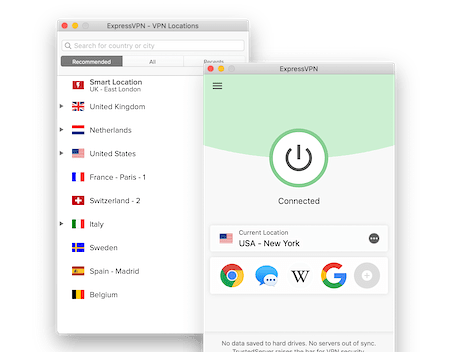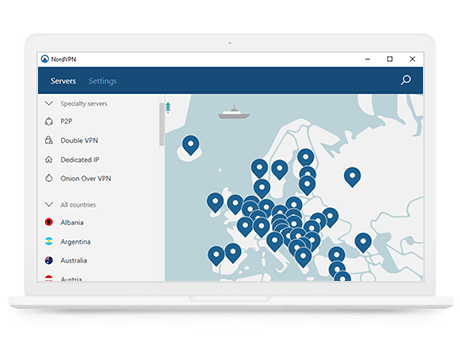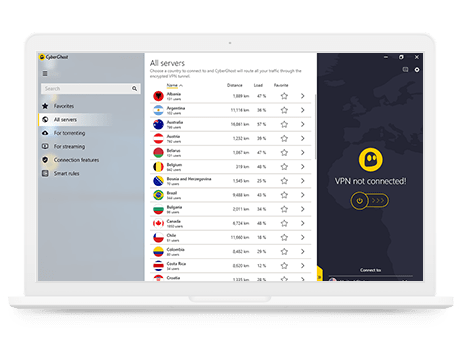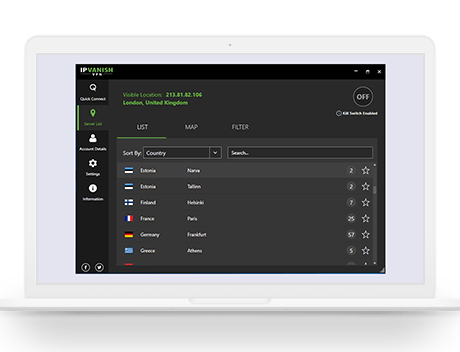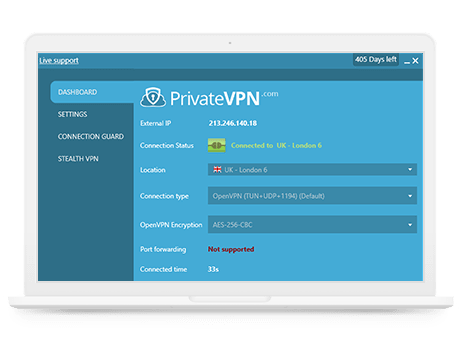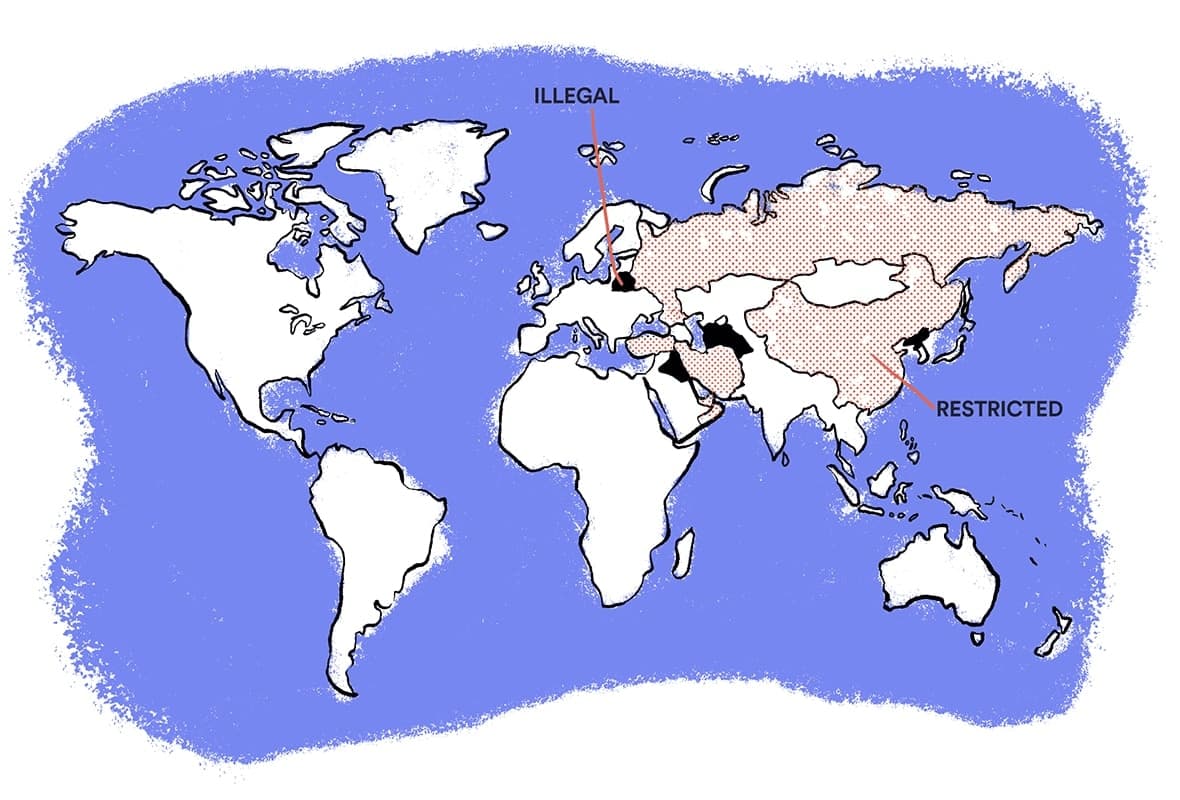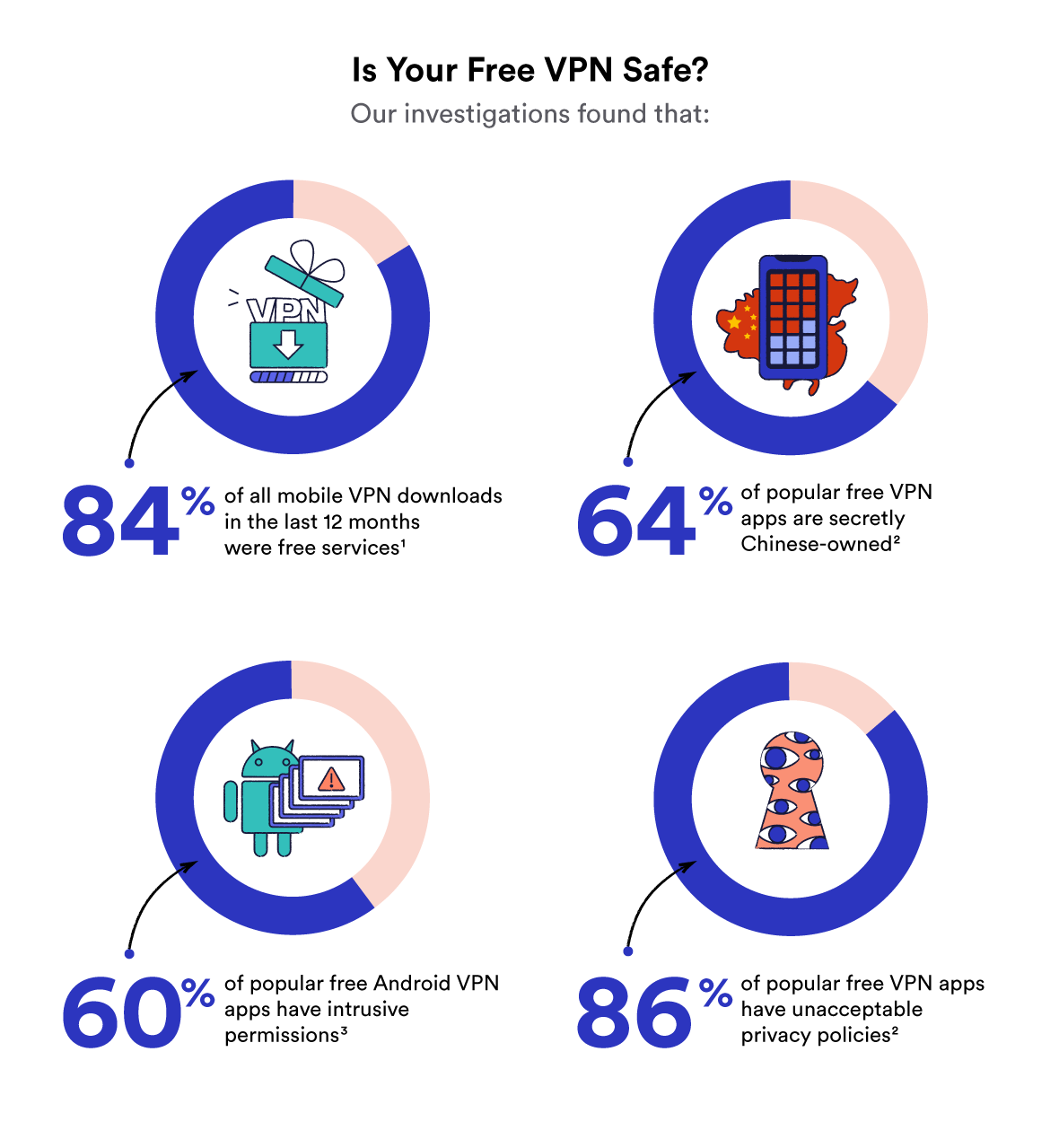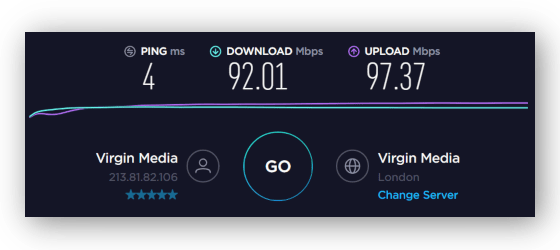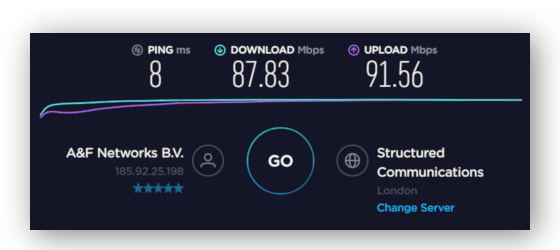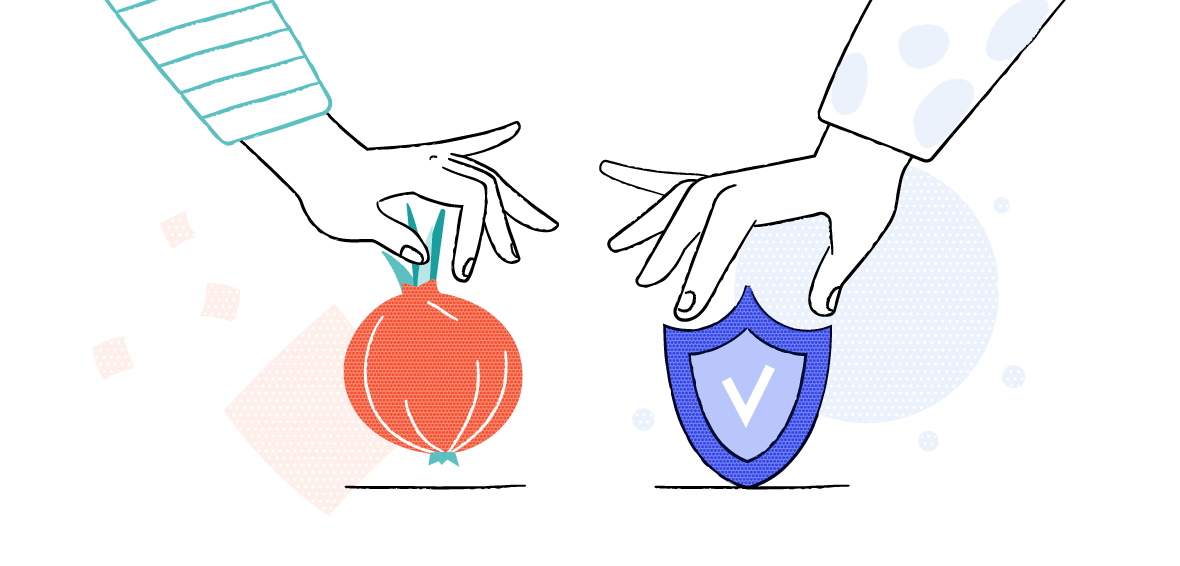A Virtual Private Network (VPN) is software that:
- Routes your web traffic through secure servers
- Changes your IP address to an anonymous one
- Makes you more secure and private online
And personal VPN services are becoming very popular. Just last year, over 400 million mobile VPN apps were downloaded worldwide.
However, there are hundreds of VPNs out there: some good, some bad, and some dangerous ones that put your online security and privacy at risk.
So, how do you choose the right VPN?
That’s where we come in. Since 2016, we’ve spent over 30,000 hours testing and reviewing more than 70 VPNs to answer the ultimate question:
What’s the best VPN for 2020?
The VPNs in this guide are the most impressive we’ve seen: they are fast, private, and secure. With them you can:
- Hide your web activity from ISPs and snoopers
- Torrent safely and anonymously
- Unlock video content worldwide (Netflix, BBC iPlayer, etc.)
- Use public WiFi securely (in coffee shops, hotels, etc.)
- Bypass strict online censorship, even in China
Scroll down to see the best five VPN services we recommend. You’ll also find additional information and resources further down the page.
Main VPN Features We Reviewed
- Privacy and security features
- Download (and upload) VPN speeds
- Logging policy, IP leak protection & jurisdiction
- Netflix and torrenting availability
- Device compatibility and ease-of-use
- Cost and value for money
Wondering why you should trust our reviews?
See How We Review VPNs.
Best Fast & Safe VPNs
1. ExpressVPN - Best Overall
Ranked #1 of 74 VPN services
98%
(1,691 user reviews)Visit Expressvpn.comPros
- Exceptionally fast VPN speeds
- No user web logs & no IP address leaks
- Unblocks Netflix, BBC iPlayer, Disney+ & more
- Unrestricted torrenting & P2P traffic
- Over 3,000 VPN servers in 94 countries
- Easy to use apps & VPN browser extensions
Cons
- Shorter plans are expensive
- No kill switch for iOS or Android
- Firestick app design needs improving
-
Best Price
$6.67/mo over 15 Months
-
Top Speedi
85Mbps same city speed
-
Servers
94 countries, 3,000+ servers
-
Compatible with
Windows
Mac
iOS
Android
Linux
The Bottom Line
ExpressVPN is an extremely safe and private VPN provider – in fact, it’s currently the absolute best VPN service and our extensive testing proves it.
As a whole package ExpressVPN simply can’t be beaten; its consistency is exceptional, with fast and reliable VPN speeds around the world.
It’s great for torrenting, and it easily unlocks eight Netflix libraries (including the US catalogue), BBC iPlayer, Hulu, HBO and many other popular streaming services.
Furthermore, it efficiently bypasses aggressive censorship blocks in countries like China, Turkey and the UAE.
ExpressVPN comes with advanced security features like ‘Network Lock,’ a VPN kill switch to keep you protected if your VPN connection drops. This isn’t available for iOS or Android, though, as with many other VPN services. There are workarounds, though.
Based in the British Virgin Islands (a privacy haven), ExpressVPN doesn’t collect any personally identifiable logs. And, we didn’t detect any IP, DNS, or WebRTC leaks on any of its VPN apps.
In fact, ExpressVPN’s logging policy was put to the test in December 2017 when one of its Turkish servers was seized by the Turkish authorities. They couldn’t find any user connection logs.
Also, we love ExpressVPN’s user-friendly interfaces – all the apps are very easy to use and well designed (apart from the Firestick app).
You can also use its Chrome and Firefox extensions, if you prefer in-browser access to the VPN. And for the more tech-savvy, the pre-configured ExpressVPN router is one of the best around.
While it’s more expensive than the other VPNs in our list, ExpressVPN is still affordable and great value for money considering what you get with it.
For a more in-depth look, read our full ExpressVPN review.
2. NordVPN - Best Alternative
Ranked #2 of 74 VPN services
94%
(242 user reviews)Visit Nordvpn.comPros
- Very fast same-country speeds
- No logs & no IP, DNS or WebRTC leaks
- Works with Netflix, BBC iPlayer, Disney+, etc.
- Huge server network (over 5,500 servers in 58 countries)
- Torrenting P2P allowed on many servers
- Simple custom VPN apps for range of platforms
Cons
- Extra VPN protocols for Windows & Android require manual configuration
- Not always working in China
- Doesn't unblock streaming apps on Amazon Firestick & routers
- Responded late and poorly to a 2018 server breach
-
Best PriceExtra 3 months free
$3.49/mo over 36 Months
-
Top Speedi
90Mbps same city speed
-
Servers
58 countries, 5,500+ servers
-
Compatible with
Windows
Mac
iOS
Android
Linux
The Bottom Line
NordVPN is one of the safest and most secure VPN services.
Headquartered in privacy-friendly Panama, NordVPN has the second-biggest server network after CyberGhost: over 5,500 secure VPN servers spread across 58 countries.
Unsurprisingly, the NordVPN apps have excellent privacy features, such as a VPN kill switch, Double VPN and AES-256 encryption.
And, NordVPN doesn’t keep any user logs, in case your were wondering.
While it’s not as good as ExpressVPN for streaming, NordVPN still works very well with BBC iPlayer, Netflix (with access to seven libraries), Disney+ and plenty more streaming platforms. Consistent fast download speeds will deliver fast buffer-free viewing in HD and 4K.
However, NordVPN recently stopped working with major streaming services on Amazon Fire TV and through router-level VPN connections.
In October 2018, NordVPN proved its commitment to transparency and privacy by allowing a team from PricewaterhouseCoopers AG (PwC) to inspect its VPN servers and code, as part of an independent audit of its logging policy.
This audit was the first of its kind in the VPN industry, and has paved the way for other VPN services to do the same.
However, we need to make you aware of a security incident suffered by NordVPN. In October 2019 it came to light that a NordVPN server had been breached by a hacker in 2018.
No user information was taken, no data was logged, and the VPN encrypted tunnel wasn’t compromised. That said, the hacker exploited a worryingly simple vulnerability, and we’re disappointed by NordVPN’s delayed response.
Despite this incident, NordVPN remains a very good VPN, but it’s still something to consider. You read more about the security breach here.
Just like ExpressVPN, NordVPN has custom VPN apps for a wide range of devices and you can use them on up to six devices at once (one more than ExpressVPN). And it comes with browser extensions for Chrome and Firefox.
NordVPN is a decent choice for China, but its obfuscation tools aren’t as reliable as ExpressVPN’s. NordVPN’s apps usually require some manual configuration to get them to work in highly-censored countries.
Nevertheless, NordVPN is a great alternative to ExpressVPN – and cheaper too.
For a more in-depth look, read our full NordVPN review.
3. CyberGhost - Best Value
Ranked #3 of 74 VPN services
94%
(256 user reviews)Visit Cyberghost.comPros
- Very fast & reliable VPN speeds
- Doesn't keep user logs & doesn't leak
- Dedicated streaming servers for Netflix & BBC iPlayer
- Optimized VPN servers optimized for P2P traffic
- Biggest server network (6,200+ servers across 90 countries)
- Automatic public WiFi protection
Cons
- P2P not allowed on Australian servers
- Won't work in high censorship nations
- Monthly plan has a short refund period
-
Best PriceExtra 2 months free
$2.75/mo over 3 years
-
Top Speedi
87Mbps same city speed
-
Servers
89 countries, 6,200+ servers
-
Compatible with
Windows
Mac
iOS
Android
Linux
The Bottom Line
CyberGhost VPN is one of the most established VPN services, and currently one of the cheapest – it’s also very safe to use.
CyberGhost’s 6,200+ servers form one of the largest VPN server parks. Its dedicated streaming servers work flawlessly with Netflix (four libraries), BBC iPlayer, Disney+, and much more.
Undoubtedly, CyberGhost is one of the best VPN services for fast and unrestricted streaming around the world.
And all is good on the anonymous torrents front too, thanks to its P2P-optimized servers. It’s a shame that torrenting isn’t allowed on the Australian servers, though.
Moreover, CyberGhost is a super choice for privacy: great security features like automatic WiFi protection and the kill switch, and a robust no-logs policy. And we’ve never detected any IP, DNS, or WebRTC leaks in our lab tests.
CyberGhost VPN is compatible with all widely-used computers and smartphones, and you can use the VPN on up to seven devices at once – that’s more than ExpressVPN and NordVPN.
Overall, CyberGhost is a very strong contender for best VPN service. Just don’t expect it to work in high censorship countries like China, Turkey, or the UAE.
For a more in-depth look, read our full CyberGhost review.
4. IPVanish - Best for Fire TV Stick
Ranked #4 of 74 VPN services
98%
(173 user reviews)Visit IPvanish.comPros
- Impressive VPN speeds
- No-logs policy & verified IP leak protection
- Works with Netflix
- All VPN servers allow torrenting traffic
- Best VPN app for Fire TV Stick
- Over 1,300 VPN servers in 50 countries
Cons
- Doesn't work with BBC iPlayer or Disney+
- Doesn't work in China
- No browser extensions
- Short refund period (7 days)
-
Best Price
$3.99/mo over 12 months
-
Top Speedi
84Mbps same city speed
-
Servers
50 countries, 1,300 servers
-
Compatible with
Windows
Mac
iOS
Android
Linux
The Bottom Line
IPVanish is a remarkable VPN, and it has recorded some of the fastest speeds in our speed tests. It’s particularly popular with torrenting, Kodi, and Firestick fans.
The IPVanish server park isn’t huge – around 1,300 servers – but the number of IP addresses available is: there’s over 40,000.
IPVanish has a kill switch on both Windows and MacOS devices, and a strict no-logs policy. This is critical, as IPVanish is based in the privacy-unfriendly US.
Reassuringly, we didn’t detect and IP, DNS, or WebRTC leaks in our extensive leak testing.
IPVanish does work with Netflix, but disappointingly it doesn’t work with BBC iPlayer or Disney+. It also won’t beat web censors in countries like China and the UAE.
Like its top rivals, IPVanish is available on all popular devices. And you can use the IPVanish apps on up to 10 devices at once with just one subscription. That’s very generous.
Surprisingly, there are no VPN browser extensions available. And, the IPVanish money-back guarantee isn’t great either: only seven days.
All in all, IPVanish is a solid VPN for privacy. Torrenters and Kodi fans should seriously consider it. However, streaming fans should opt for one of the other four VPNs we recommend.
For a more in-depth look, read our full IPVanish review.
5. PrivateVPN - Best Free Trial
Ranked #5 of 74 VPN services
98%
(1,733 user reviews)Visit Privatevpn.comPros
- Consistently fast VPN speeds
- No logging & no IP, DNS & WebRTC leaks
- Works with Netflix, BBC iPlayer & more
- No limits on torrenting traffic
- 7,000 individual IP addresses in 59 countries
- Very simple & user-friendly VPN apps
Cons
- No browser extensions available
- Only 150 VPN servers in total
- Live chat isn't always available
-
Best PriceExtra 12 months free
$1.89/mo over 2 years
-
Top Speedi
86Mbps same city speed
-
Servers
59 countries, 150+ servers
-
Compatible with
Windows
Mac
iOS
Android
Linux
The Bottom Line
PrivateVPN is a relative newcomer in the VPN world, but in that short time it has become one of the highest-rated VPN service providers.
Its VPN connections are fast and reliable around the world, with unrestricted access to Netflix and BBC iPlayer. This is where PrivateVPN shines: it unblocks an eye-watering 19 Netflix libraries!
Torrenting is allowed on the entire server network, with special servers optimized for P2P traffic. And gamers will enjoy the very low ping times.
But, PrivateVPN’s server network is very small (only 150 servers), however this shortcoming is compensated somewhat by the 7,000 IP addresses available. As PrivateVPN’s subscriber base grows, it will need to invest in its server infrastructure.
Luckily, PrivateVPN lives up to its name: it’s very private and secure. It doesn’t log users’ web activity, it has a working VPN kill switch, and it won’t leak your true location.
PrivateVPN’s apps are available on a wide range of devices, including the Amazon Fire TV Stick. And they’re all really easy to set up and use.
Unfortunately, while all of our other top VPN recommendations have 24/7 live chat support, PrivateVPN’s support is intermittent at best.
Nevertheless, PrivateVPN has a lot going for it and we’ve been impressed it so far. However, it does have some way to go before it can seriously challenge the top four VPNs ranked above it.
For a more in-depth look, read our full PrivateVPN review.
VPN Services: A Closer Look
How We Test & Review VPNs
We thoroughly test out each VPN reviewed on our website, and make sure to keep our recommendations up-to-date so that you can make informed decisions.
Our VPN reviews and guides are honest and unbiased – we never accept compensation in exchange for positive coverage.
We have a rigorous testing methodology that always follows these 10 steps:
- We purchase the VPN subscription. We never take press samples or freebies (unless the VPN itself is free).
- We download, install, and test the VPN on multiple platforms: Windows, MacOS, Android, iOS, and even Amazon Fire TV Stick.
- Once we’ve installed the VPN software we see how easy (or hard) it is to use, for example finding specific server locations.
- We examine the security features and level of encryption. Does the VPN service come with a kill switch? Does it use AES-256 encryption?
- We test for IP, DNS, and WebRTC leaks to see if the VPN truly hides your real IP address, and to understand how private the VPN really is.
- A VPN needs to be fast, so we test speeds manually in our lab and automatically using our proprietary speed testing tool to give you the most accurate results.
- We test to see whether it works with popular streaming services (like Netflix and Disney+), torrenting and other P2P activity.
- Some countries, like China, operate strict online censorship and block many VPN connections. We find out if the VPN can bypass these web blocks.
- An extremely important part of our review process involves thoroughly reading a VPN provider’s privacy and logging policies. We also look into who owns the VPN company and where it’s based. By doing this, we are able to understand how private, safe, and trustworthy the VPN is.
- Finally, we put the VPN’s customer support to the test. We ask its support agents a wide range of questions, from the most simple to the most technical, to see how knowledgeable and helpful they are.
Read all about how we review VPN services here.
Why You Should Use a VPN
Now you know what a VPN is you’re probably wondering: why should I use one?
Well, there are many reasons to use a VPN. Here are the main ones:
1Hide your web activity from ISPs, governments & snoopers
Without a VPN, your internet service provider (ISP) logs everything you do online.
If that’s not unsettling enough, in certain countries ISPs are forced to track and store customers’ online activities and hand it over to the authorities if asked to.
That’s pretty scary.
In the United States, ISPs are also permitted to collect, share, and sell your personal data and information about your online habits to third parties, including advertisers.
They can do this without your explicit consent. That’s a huge infringement of your privacy.
If you want to prevent this from happening you need to use a trusted VPN service.
When you connect to a VPN server, your internet provider is unable to see beyond that server and therefore can’t track what you do online.
2Bypass geo-restrictions
You already know that the internet provides a wealth of information and content, but did you know that not all of it is accessible from where you live?
That applies to every country.
When you connect to a VPN server your real IP address is replaced with the IP address of the server.
You can unlock geo-restricted content by connecting to a VPN server in the region where that content is readily available, as the website will think you’re really in that country.
Just make sure the VPN service you choose comes with VPN servers in your desired countries or cities.
One popular example of geo-restricted content is Netflix.
Netflix libraries are different in every country, varying in size and content drastically from one to another.
If you aren’t in the US but want to access US Netflix – which has the biggest Netflix content library in the world – you’ll need to use a VPN.
3Protection against hackers on public WiFi
Public WiFi hotspots are dangerous.
Why?
Because they can be vulnerable to hackers who might try to steal your personal information.
Hackers can conduct a man-in-the-middle (MITM) attack on your device, eavesdrop, intercept your private data, or carry out a phishing scam.
While convenient, free WiFi networks in restaurants, coffee shops, department stores, and on public transport are all very risky.
Using a VPN can help stop hackers from carrying out these attacks.
This means can use the internet while out and about without the worry of being spied upon or having your details stolen.
4Beat online censorship imposed by governments, workplaces, or schools
Censorship seems to be everywhere now – it’s no longer restricted to the most authoritarian regimes like China.
The owner of any internet network can impose blocks to specific websites and apps. The most common examples are in the workplace, schools, or libraries.
Governments can force ISPs to block websites and apps, too.
In China, for instance, Google, Facebook, and Twitter are all blocked, along with thousands of other websites.
The best – and safest – way to get around censorship blocks is to use a good VPN.
Not all VPNs work in China, though. In fact, only a few VPNs can beat the country’s sophisticated censorship tools.
What Can’t You Do with a VPN?
Using a VPN is essential for your online security and privacy, and it allows you to access content from all over the globe.
But even VPNs come with limits.
Here are some things that a VPN can’t do:
- Provide complete antivirus/malware protection. Always install trusted antivirus software, even if your VPN has a malware-blocking feature (like Hotspot Shield).
- Store all of your passwords together securely. You’ll need a password manager for this.
- Increase your maximum internet speed, unless your ISP is throttling your connection.
- Block ads. Some VPNs come with an ad-blocker, but if yours doesn’t then it’s definitely worth getting one.
Are VPNs Legal?
VPNs are clearly very useful tools, but are they legal?
Yes, VPN services are legal in almost every country except for a handful listed below.
| Country | VPN Status | Social Media Blocks | Censorship | Surveillance |
|---|---|---|---|---|
| Belarus | Illegal | Moderate | Extensive | Extensive |
| China | Restricted | Extensive | Extensive | Extensive |
| Iran | Restricted | Moderate | Extensive | Extensive |
| Iraq | Illegal | Moderate | Moderate | Minor |
| North Korea | Illegal | Extensive | Extensive | Extensive |
| Oman | Restricted | Minor | Extensive | Moderate |
| Russia | Restricted | Moderate | Extensive | Moderate |
| Turkey | Restricted | Moderate | Extensive | Extensive |
| Turkmenistan | Illegal | Extensive | Extensive | Extensive |
| UAE | Restricted | Moderate | Extensive | Moderate |
If you’re located outside of the above countries, you can download and use a VPN without any legal worries.
To know more about the legality of using VPNs, read our ‘Are VPNs Legal?’ guide.
Can You Trust Your VPN Service?
It depends.
When you use a VPN all your internet traffic flows through the VPN provider’s servers. So you want to be sure that you’re using a VPN worthy of your trust.
How do you know if you can trust your VPN service?
A good, trustworthy VPN doesn’t keep user activity logs, doesn’t leak your true IP address, it properly encrypts web traffic, refuses to hand over user data to those it doesn’t belong to, and is based in a secure and safe jurisdiction.
A bad VPN collects extensive user logs, mines and sells data, manipulates your traffic, and can even share your browsing data with the government and any number of third parties.
Before you decide which VPN to use, you should make sure you understand what encryption it uses, what type of data it logs, and what legal jurisdiction it falls under (follow the links to go to the relevant guides).
We make sure to cover all of these important factors in our independent VPN reviews.
There have been several cases of VPN providers abusing their power, so here are some noteworthy VPN controversies:
Hotspot Shield
Hotspot Shield has been embroiled in a few controversies over the years. In August 2017, it was alleged that Hotspot Shield had been injecting affiliate links into users’ traffic in order to monetize it.
At the time, this was fully disclosed in the privacy policy, which has since been completely rewritten.
In February 2018, a security researcher found a vulnerability that allowed hackers to see users’ true locations via their WiFi network name. Hotspot Shield addressed and fixed the issue.
Hola VPN
This peer-to-peer proxy service that falsely brands itself as a VPN is bad news all around.
The free version doesn’t encrypt your traffic and it keeps logs of everything you do online.
Here’s a very concerning section of Hola’s privacy policy.
The free version of Hola also uses personal IP sharing to create its network, meaning your IP address will be used by strangers to do whatever they want with it.
You should avoid using Hola at all costs.
IPVanish
In 2016, under previous management, IPVanish handed information (including user logs) over to US authorities as part of a court case. StackPath acquired IPVanish in 2017, and when the news broke this breach of privacy, it assured IPVanish users that it “does not, has not, and will not log or store logs of […] users’ activity as a StackPath company”.
We’ve done our due diligence with regards to IPVanish, and we’re happy to say that it’s now safe and private.
Pirate Chick VPN
Pirate Chick VPN posed as a legitimate VPN service but was in fact acting as a Trojan virus host, installing malicious payloads on its victims.
PureVPN
In October 2017, PureVPN handed over one user’s information to the FBI that included their IP address, despite its logging policy stating: “We do NOT keep any logs that can identify or help in monitoring a user’s activity.” You can read the court case file here.
PureVPN subsequently revamped its logging policy, which now clearly states that it does not log users’ originating IP addresses:
PureVPN’s updated logging policy
PureVPN recently commissioned an independent body to audit its logging policy.
But it’s not all doom and gloom.
There are plenty of VPN services that have proven their trustworthiness and commitment to privacy:
ExpressVPN
In December 2017 the Turkish authorities seized and inspected one of ExpressVPN’s Turkish servers, but they couldn’t find any customer connection logs.
ExpressVPN also underwent an independent audit by PwC in July 2019 to verify its TrustedServer feature and privacy policy. Cure53 has also audited ExpressVPN’s Google Chrome browser extension.
Private Internet Access
In addition to its regularly updated transparency reports, Private Internet Access’ no-logs claim has been proven to be true multiple times during court cases (one in 2016 and the other in 2018) where authorities requested user information and PIA couldn’t hand any over.
Here’s Private Internet Access’ Transparency Report for July-December 2018.
Be sure to read our comprehensive VPN reviews to find out if a VPN is trustworthy or not. We’ve done the research so you don’t have to.
Free vs Paid: Are Free VPNs Safe?
Often when you have the choice between a free product and a paid product, the free one will be worse.
Unfortunately, this is absolutely the case with VPNs.
Many free VPN services come with drawbacks like:
- Tiny VPN data allowances
- Speed caps
- Limited server locations
- Loads of ads
And unfortunately it doesn’t end there…
Some free VPNs pose serious risks to whoever uses them.
When we recently examined the 150 most popular free Android VPN apps we found that over 85% were potentially unsafe.
Sources: 1 Global Mobile VPN Report, 2 Free VPN App Investigation, 3 Free VPN Risk Index: Android Apps
We 100% recommend that you use a paid VPN, if you can afford the small monthly fee of course.
Are there any good free VPNs out there, though? Yes. Read on to find out which are the best.
What's the Best Free VPN?
There are only a handful of free VPNs that we recommend.
Currently, the best ones are:
They do come with some restrictions but, most importantly, they are safe to use.
Find out why we chose these five free VPNs in our dedicated guide to free VPNs.
Tip: Using Paid VPNs for Free
All of the free VPNs that we recommend are ‘freemium’ VPNs. This means that, while free, they are essentially stripped-back versions of the premium product.
Here’s a table showing the difference between the premium and freemium versions of our top five free VPNs:
| VPN Name | Avira Phantom | Hide.me | ProtonVPN | TunnelBear | Windscribe | |
|---|---|---|---|---|---|---|
| Server Country Locations | Data Cap | Simultaneous Connections | ||||
| Free | Premium | Free | Premium | Free | Premium | |
| 1 | 34 | 1GB/mo | Unlimited | Unlimited | Unlimited | |
| 4 | 36 | 2GB/mo | Unlimited | 1 | 10 | |
| 3 | 44 | Unlimited | Unlimited | 1 | 5/10 | |
| 23 | 23 | 500MB/mo | Unlimited | 5 | 5 | |
| 10 | 58 | 10GB/mo | Unlimited | Unlimited | Unlimited |
But not all premium VPNs have a ‘freemium’ option.
Don’t worry, though.
You can still use some premium VPNs for free – at least for a period of time.
Many VPNs offer free trials or money-back guarantees so that you can fully test out the VPN software before you commit to it for the long term.
Look for a 30-day money-back guarantee with ‘no questions asked’. That way you know that you’ll get a refund if you aren’t satisfied with the service.
Here are some guides for getting popular VPNs for free:
How Much Should You Pay for a VPN?
First things first: if you can pay for a VPN service, you really should.
Not because we want you to spend money, but because free VPNs are limited at best and dangerous at worst.
So, how much should you be paying for a VPN?
It really depends on your budget and whether you’re ok paying a larger upfront sum of money to make longer-term savings.
Most VPN services offer a range of plans of varying lengths, usually from one month to three years. Some even offer lifetime subscriptions. The longer the plan the greater the savings you’ll make on a monthly basis.
But, you need to keep in mind that you’ll usually have to pay for the whole subscription up front.
In other words, if you buy a two-year VPN plan for $2.99 a month, you’ll have to pay $71.76 when you sign up.
If you can’t afford to pay for yearly subscriptions, it’s also possible to pay month-by-month (on a rolling basis) but it’ll be much more expensive in the long run.
We’ve seen month-long subscriptions for as cheap as $8.00, all the way up to as much as $16.
One thing to remember is that the quality of a VPN doesn’t necessarily increase with the price so make sure you read our VPN provider reviews to find out whether a VPN is worth buying.
Can You Be Tracked if You Use a VPN?
A VPN does not make you 100% untraceable – it’s important to bear that in mind and set your expectations accordingly before downloading one.
If someone, be they a hacker or government, wants to track you down online then with enough determination they will be able to.
However, tracking someone who uses a VPN is significantly more difficult than tracking someone who doesn’t.
A proper VPN service will swap your IP address and DNS servers for one of its own, encrypt your traffic thoroughly, and then delete any connection and browsing logs that you leave behind so as to secure your anonymity.
The rule when using a VPN is simple: don’t do anything when connected to a VPN that you wouldn’t do without one.
You can reduce the chances of being tracked online by using a privacy-friendly web browser – as opposed to, say, Google Chrome – alongside your VPN.
Let’s take Tenta Browser as an example.
This privacy-centered web browser automatically blocks ads and trackers, and it vows never to sell your personal data.
You should also consider how search engines like Google and social media sites like Facebook track, log, and sell your personal information. If you’re concerned about this, use a more private search engine like DuckDuckGo.
Are VPNs Easy to Use?
When we test a VPN service, we really download, set up, and use it.
We test every VPN app on every platform offered to make sure it’s as easy as possible to use.
Whether you’re a VPN beginner or a tech expert, our best VPN recommendations are intuitive and quick to set up, with lots of advanced features that are clearly labeled, accompanied by in-depth online support.
Take a look at the ExpressVPN Windows app, for instance:
As you can see, ExpressVPN’s custom app is clean, intuitive, and simple.
Just select the VPN server location and hit the big connect button – you’re good to go.
In addition to the VPNs on this page, we also recommend Windscribe, ProtonVPN, and Surfshark as VPN apps that are very easy to use.
But not all VPNs are as easy to use.
Here’s an example of a more complicated VPN app:
AirVPN is a great VPN for experienced users, but its custom apps are unintuitive and user-unfriendly.
They’re cluttered, confusing, and even frustrating at times. But AirVPN’s apps do come with loads of configurable options that some simpler apps lack.
If you’re a VPN beginner, we recommend using a VPN service with simple custom apps before moving onto more complicated ones like those of AirVPN.
VPN Device Compatibility
Depending on the VPN service that you choose, you can use a VPN on pretty much any internet-connected device.
Some VPNs offer custom/native apps for a wide range of devices (like the ones recommended on this page), while others come with only mobile apps, for example.
It’s sometimes possible to manually configure VPNs to work on devices or platforms that lack a custom app. This is a little trickier than downloading an app, though.
Take a look at the following guides to find out the best VPNs for a particular device:
You can also install VPN add-ons for your browser, though these are proxy extensions rather than full-blown VPN connections.
These are available for Google Chrome, Mozilla Firefox, Safari, and Opera. We have rounded up the top VPN extensions for the following browsers:
You can even install a VPN on your router (read more below), to protect all internet-connected devices in your home.
What's the Best VPN for iPhone?
The best VPN for iPhone is ExpressVPN – it comes with a super simple custom app for iOS devices – that includes iPads – and it’s very fast, secure, and private.
ExpressVPN is also our top choice for Android smartphones too.
How to Set Up a VPN
It’s very easy to install and set up a VPN, as long as it comes with custom apps.
All you need to do is download the app from the VPN provider’s website (or an official app store), follow the installation prompts, and log in.
If there are no native apps available for your device, you may be able manually configure the VPN.
Take a look at our step-by-step setup guides for the following devices and platforms:
Once you’ve installed the VPN onto your device, you should take a look at the VPN settings before you connect to a server.
Be sure to enable the VPN kill switch and any DNS, IPv6, and WebRTC leak protection, if there’s an option to do so.
Now you’re all set – select your preferred VPN server and click the connect button.
Does a VPN Slow Down Internet Speed?
VPNs do slow down your internet speed, but not by much if you choose the right VPN.
VPNs work by routing your web traffic through an encrypted tunnel, which slows down your internet speed a little in the process. Usually, the stronger the encryption, the slower the speed.
However, the very best VPNs will deliver fast speeds while keeping your connections very secure. The VPN providers we recommend on this page will only slow your internet down by 10% or less (if you connect to nearby servers).
A speed loss of 10% or less will allow you to stream, torrent, and browse the web just like you normally do without a VPN. But, you’ll be much safer doing so with one.
If you want to know what the quickest VPN is, take a look at the fastest VPNs of 2020.
A few tips to increase your VPN speed:
- If possible, connect to the nearest VPN server to your physical location. The farther away the VPN server is, the slower the speeds will be.
- If your VPN shows individual server loads within the app, choose the server with the lowest server load.
- Some VPN protocols are quicker than others. Changing protocol can improve speeds, but be aware that speed sometimes comes at a price. Learn the difference between VPN protocols in our VPN encryption guide.
Can a VPN sometimes increase your internet speed?
Using a VPN can sometimes increase your internet speed, if your ISP is throttling your traffic when you stream or download large files.
What's the Fastest VPN?
When it comes to speed reliability and consistency around the world, ExpressVPN is the fastest VPN.
But, it’s not the fastest when connecting to nearby servers – that’s Private Internet Access.
However, even on same-country connections ExpressVPN only slows down internet speeds by about 11%. Take a look at our speed test below:
This is our internet speed with no VPN.
Here is our internet speed when connected to ExpressVPN.
Can You Use a VPN to Watch Netflix?
Yes, you can use a VPN to watch Netflix and to unlock their regional video libraries.
Did you know that US Netflix has twice the number of TV shows as UK Netflix?
However, not every VPN works.
Netflix actively blocks VPN connections – ever seen this annoying error message when you try to stream Netflix with a VPN or proxy?
If you don’t want to see the above message, you’ll need to use one these VPNs that (still) unblock Netflix.
Some VPN services like CyberGhost and PrivateVPN come with dedicated streaming services that help you unlock video content instantly.
Others like ExpressVPN and NordVPN don’t, but most of their servers work with most popular services.
If a server doesn’t unblock Netflix, get in touch with a VPN provider’s live chat support team to find out which VPN servers still work.
Other streaming services you can watch with a VPN are BBC iPlayer, Disney+, Hulu, HBO, and many more.
Do You Need a VPN When Torrenting?
A safe and trustworthy VPN is an essential tool for anonymous torrenting and other P2P activity.
Why?
The moment you open up a torrent client and begin downloading or uploading files your IP address is exposed to your ISP.
Using a secure VPN will hide your true IP address and encrypt all of your traffic.
When it comes to choosing a VPN for torrenting, there are two necessities: speed and privacy.
A good VPN will make your torrenting much more private, with very little impact on your download speeds.
Some VPN services even have special servers designed for torrenting.
If you’re a keen torrenter, then take a look at the most private and safest VPN services for torrenting.
Tip: Before you open up your torrenting client, make sure you turn on your VPN and enable the VPN kill switch. This will prevent your true IP address from leaking.
VPN vs Proxy: What's the Difference?
VPNs and proxies are often mixed up, but they are not the same.
Both tools help users to get around content blocks, but when it comes to privacy the two pieces of software are pretty different.
Proxies hide your real IP address and location from the website you are trying to access, but they often don’t encrypt browser traffic.
Many proxies have been known to keep logs of users’ personal data. Like VPNs, there are good proxies and bad proxies, so you should do your research before you use a free proxy (trustworthy ones are rare, and totally private ones are almost non-existent).
VPNs, on the other hand, encrypt all traffic, at an OS-level rather than a browser-level. All your personal data flows through a secure VPN tunnel, and a good VPN won’t log your online activities.
Sometimes, free services are labeled as VPNs when they are in fact proxies. One example is Hola, which we recommend you completely avoid.
VPN services often come with add-ons for certain web browsers like Google Chrome or Firefox. These browser extensions are proxies, as they work at a browser-level, not an OS-level.
The best proxy extensions use encryption to secure connections.
You can learn more about the differences between proxies and VPNs in our guide.
VPN vs Smart DNS
You can use VPNs or Smart DNS to watch streaming content, but are they the same thing?
Not at all.
Smart DNS works by changing the DNS of your device and reroutes traffic through a proxy server that will enable you to bypass regional content restrictions.
It’s primarily used to access streaming services like Netflix and Hulu.
Unlike a VPN, Smart DNS is not a privacy tool. It doesn’t encrypt traffic or hide your IP address.
ExpressVPN’s MediaStreamer tool is similar to Smart DNS.
Smart DNS is very easy to set up (including on games consoles and streaming devices) and it allows for faster speeds than a VPN connection.
But, again, it won’t help keep your personal data private.
VPN vs Tor
Tor (The Onion Router) and VPNs are both privacy tools, but they aren’t one and the same.
In fact, Tor is more of an anonymity tool than a privacy tool. It is often used by political activists and journalists in high-censorship countries.
The Tor browser directs internet traffic through a global network of volunteer-run servers.
The traffic is routed through guard nodes, middles, servers, and exit nodes (all randomly selected), so that no one server knows both what the message is and where it came from.
Because of this process, Tor is very, very slow.
One of the other issues related to Tor is that others will be using your IP address, and you don’t know what they will be doing with it.
Tor is commonly used to access the Dark Web, which is a nesting ground for criminal and illegal activity.
That’s why you should use a VPN alongside Tor for extra security. Some VPN services even come with special servers for use with Tor.
If you want to know more about Tor, read our guide to Tor vs VPN.


